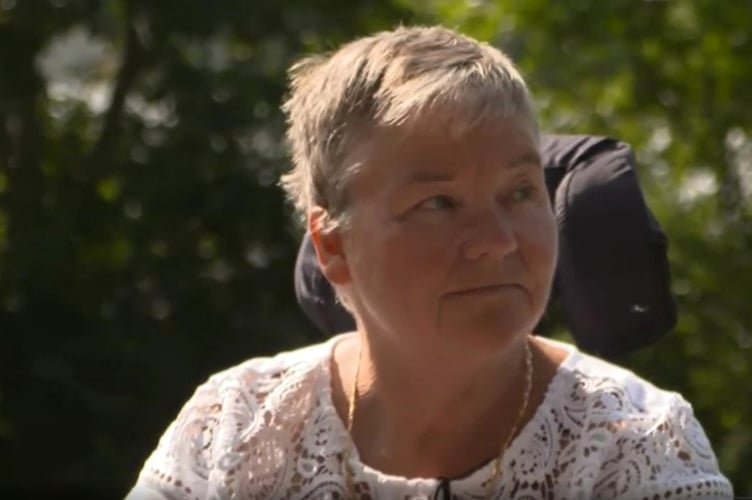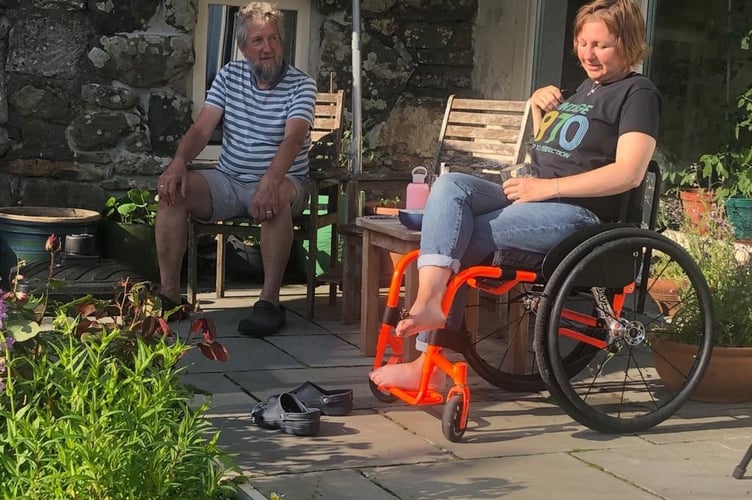A woman who is suing Dyfed-Powys police for unlawful arrest is calling for the assisted dying bill to cover those with incurable suffering.
Sue Lawford said she is traumatised from her arrest when she was held in a cell for 19 hours after she returned from a trip to Switzerland where she had chaperoned Sharon Johnston to the assisted dying clinic Dignitas in 2022.
Sharon from Aberystwyth was 60 and paralysed from the neck down.
In light of two new bills about to pass through parliament on assisted dying, Sue is calling for them to include people like Sharon.
One of the new bills would legalise assisted death for those with terminal illnesses, but not those with life-long conditions like Sharon’s.

Under current laws, if a friend or family member stayed with her whilst she ended her life at home, or travelled with her to the Dignitas assisted dying clinic in Switzerland, they could be prosecuted with up to 14 years in prison.
Sue said the arrest and six-month investigation had severely damaged her mental health: “I still get flashbacks from the arrest.
“It sounds silly but I’d [become panicked] when seeing police vans whilst out.
“I became extremely fond of Sharon, but I wasn’t emotionally invested in the way you would be as a family member or spouse.
“Just think if you were someone coming back from Dignitas having to endure arrest when you’re already grieving – it's totally inappropriate and piles on the agony.
“As far as I was concerned, what I did was a compassionate act.
“To try and misrepresent it and suggest something wicked was going on is unjust.
“To be told what I’d done is the equivalent of manslaughter or terrorism is horrible.”
Sue volunteered to chaperone Sharon after she reached out to the campaigning group My Death, My Decision.
She said that arresting those who accompany people to Dignitas is disability discrimination: “I think it’s awful that anyone has to go to Switzerland – we're outsourcing death in a way.
“The bill is a fantastic step forward, but we need to try and include those who are intolerably or irreversibly suffering.
“It comes down to having autonomy.
“Sharon didn’t have the option to go by herself as a tetraplegic.
“We’re only talking about people who are absolutely at the end of their tether – most people want to live for as long as possible.
“Sharon only had one family member, could move her head and one finger of her right hand, and her prognosis was grim in that she was likely to lose the little movement she had left.
“She could have existed for another 20 years but for her that was an intolerable thought.
“Having the right to a dignified end is an option we should all have.”
Miranda Tuckett and Sue are suing Dyfed-Powys police - Miranda for false imprisonment and Sue for unlawful arrest - after they accompanied Sharon to Switzerland.
Miranda is taking the police to High Court for assault and battery and breach of her academic freedoms – she accompanied Sharon as part of her doctoral thesis research into Britons travelling to Switzerland to end their lives.
Recent hope has come through two new bills which would change the laws on assisted dying.
However under one of the new bills, Lord Falconer’s, Sharon wouldn’t have been eligible for an assisted death as her condition is considered lifelong but not terminal.
This month MP Kim Leadbeater will introduce a private members bill to give people a choice about end-of-life care in England and Wales.
If either Leadbeater’s or Falconer’s bill is voted through, it would be the first update to law on this topic in 60 years.
Leadbeater’s bill, which is expected to be introduced to parliament on 16 October, will then be debated and voted on later this year.
Though specifics haven't yet been finalised, it is likely to be similar to Lord Falconer’s tabled in July which would offer terminally ill adults with six months or less medical help to end their lives – this would mean neither would help people like Louisa to self-determine their deaths.
Similar legislation is currently being considered in the Isle of Man Jersey and Scotland – with Scotland's bill having a crucial difference of no time limit to being terminal, and the Isle of Man requiring a 12-month prognosis.
Lord Falconer’s bill would also exclude people like Louisa Eastland – in 2022 Louisa from Llanegryn in Gwynedd shared her story with Cambrian News readers, also calling for a change in law - with secondary progressive multiple sclerosis (MS), she wants to control when her time comes.
The former social worker and psychotherapist, 54, said: “I want you to imagine being in a wheelchair, bed-ridden, doubly incontinent – reliant on drugs to prevent pain – and eventually you think, ‘I’m going to have to kill myself because this is unbearable’.”
Her dream death would be in her garden at home, looking out to sea with her family around her.
Louisa who bravely spoke of her intention to take her own life, declined to add to her 2022 interview but mentioned she was busy working with a documentary maker on the right to die.

However some are arguing that NHS’ palliative and social care services need to improve before an assisted dying bill is made law.
Ruth Jenkins is a former nurse of 20 years, now an outreach worker for the unpaid carers charity Credu.
The 52-year-old from Machynlleth cared for her brother who had special educational needs before a car accident left him paralysed from the neck down in his early 30s.
He passed away 17 years after the accident of natural causes.
She wanted to underline this was her personal opinion, not that of Credu’s: “It was a difficult life but I wouldn’t say that life wasn’t worth living.
“What I worry about is that we currently have a massive squeeze on care services.
"I would like everybody to have access to the care they need – at the moment they don’t.
“People are frightened of dying in pain, but with good palliative care people wouldn’t be dying alone and in pain.
“If we had the services, if we had the palliative care nurses, the support teams, all the things wrapped around a person that they deserve because they’re a human being, then would people feel like life is worth living?
“Human life is not disposable and that’s an inconvenient truth – we cannot start editing out disabled people.”
She described her previous employer Bro Ddyfi Community Hospital struggling to attract staff and that the Dyfi Valley has a shortage of support people who work in the community.
She added that she disagrees with people being prosecuted who have supported their relatives in an assisted death, but that “assisted dying isn’t the straightforward option people think it is”.
She is now caring for her dad who had a profound stroke at 87: “When you’re fit, young and healthy you think you would never want to be in the position where you can’t go to the loo by yourself.
“An unacceptable life in your youth isn’t necessarily unacceptable in old age – all human life is important and valuable, and all stages of life are.”
MP Liz Saville Roberts agrees, saying: “The Government should not prioritise decriminalisation of assisted dying over efforts to improve the dismal state of social care.”
She added that assisted dying should never be an alternative to addressing the NHS’ failures to support patients during ‘life’s hardest moments’ and called for improvements to palliative care.
However a colleague in her constituency made headlines for his decision to use Dignitas in 2015.
A Blaenau Ffestiniog councillor Bob Cole decided to end his life at Dignitas at age 68 after being diagnosed with lung cancer, 18 months after his wife used the same clinic to end her life after suffering from a degenerative brain condition, supranuclear palsy.
Ms Saville Roberts said: “I believe in a compassionate and dignified approach to assisted dying.
“Forcing people to endure life with severe physical or emotional pain is inhumane, and decriminalisation could bring better safeguards and regulation
“Legislation must not be rushed through Parliament as that would prevent full consideration of the ethical and practical implications.”
Downing Street has remained neutral on the new bills, allowing ministers to vote how they wish on the matter, without direction from the government.
Nine years ago another bill went through parliament that would mean those with less than six months to live could obtain lethal doses of drugs which they would have to take themselves.
However the bill by Labour MP Rob Marris was defeated 329 – 117 votes.
Prime Minister Kier Starmer previously stated he supports a change in the law and voted for the 2015 bill, however plenty of MPs on both sides of the Commons are against it.
Kier Starmer’s justice secretary Shabana Mahmood has previously been vocal against assisted dying, saying this year: “I know some of the MPs who vocally support this issue think, ‘For God’s sake, we’re not a nation of granny killers, what’s wrong with you’…
Health Secretary Wes Streeting also expressed concerns: “This will end up being both an ethical debate – ‘is this right in principle?’ – and it will also go to being a practical debate – ‘can this work in practice?’.
“And I think it’s contingent on us to help MPs and peers navigate those thorny issues in the most evidence-based and well-supported way as possible, recognising there’ll be sincerely and strongly held views on both sides of this debate.”
Lord Falconer’s bill, which will have its second reading in November, would require those seeking assisted death to obtain the approval of two doctors and a High Court judge, on top of the person needing to be mentally able to make the decision.
MP Leadbeater also stated her bill would include safeguards and protections to ensure people could not come under pressure to agree to assisted dying against their will, adding that her bill wouldn’t undermine calls for improvement to palliative care.
Assisted dying is categorised as a justice issue and not one concerning health, so it is not a devolved matter for the Welsh Government – though many including charities and politicians feel it should be, including Ceredigion’s Plaid MP Ben Lake.
Mr Lake sits on the APPG for Choice at the End of Life and backs Leadbeater’s bill.
However organisations like My Death, My Decision are stating neither bill goes far enough.
Trevor Moore, chair of the campaigning group, pointed out that as Leadbeater’s bill hadn’t yet been formally introduced to parliament, there is potential for it to become broader than Lord Falconer’s: “He’s constraining the debate from the onset with a narrow eligibility criteria which is unjustified and arbitrary.
“Any medic I talk to said they can’t sensibly predict a six-month prognosis.
“His bill would offer those with six months or less an assisted death, but those who suffer for longer would be excluded.
“The requirement of a high court judge is a high hurdle that would be unique in the world [compared to other country’s assisted dying laws].
“As a former funeral celebrant, I’ve seen situations where people end their lives in bleak circumstances making it far more traumatic for their loved ones.
“This experience would be transformed if they could be surrounded by the people they love, their pet dog on their lap, and have a calm end.
“We should be honest in what we’re campaigning for – banning assisted dying does not improve palliative care.
“Introducing assisted dying just gives people another option.”
In response to the law case against them, a Dyfed-Powys police spokesperson said: “In February 2022 two women were arrested on suspicion of encouraging suicide following the death of Sharon Johnston.
“They were arrested after enquiries were commenced in Cardigan into reports of a female missing from her home.
“Following an investigation the two women were told they will face no further action in August 2022.
“Further comment would be inappropriate due to the ongoing litigation.”




.png?width=209&height=140&crop=209:145,smart&quality=75)